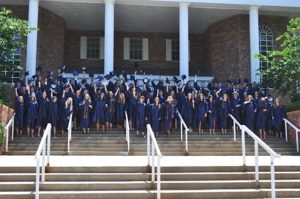Homeschooled student, also a CEO, earns Ph.D. in biomedical engineering at 19
Homeschool graduate Tanishq Mathew Abraham has a lot to celebrate. The 19-year-old CEO just completed his Ph.D. in biomedical engineering.
“Wouldn’t have done it without the love and support of…

Homeschool graduate Tanishq Mathew Abraham has a lot to celebrate. The 19-year-old CEO just completed his Ph.D. in biomedical engineering.
“Wouldn’t have done it without the love and support of my family,” he tweeted. “Mom, who gave up her PhD to homeschool us. Dad, who juggled hectic days of work for me to achieve my dreams. Sis, who made the stressful days less stressful with her jokes. 90-yr-old grandma w/ PhD who inspired me.”
The Sacramento, California youth, who was to receive his Ph.D. credentials Wednesday, defended his dissertation at the University of California, Davis, after he was admitted at age 12 for his undergraduate degree.
He’s also the founding CEO of MedARC, an organization using AI research for the medical industry, according to Stanford University’s website.
“I do think that my talents are, you know, God-given talents and that it’s important to apply these talents for the betterment of humanity and to inspire other people as well,” he said in an interview when he was 15.
‘I’m not sure if this is normal’
In a recent YouTube interview with renowned scientist and homeschooler Jeremy Howard, Abraham credits his mom for recognizing his abilities at an early age. For example, she noticed his above-average comprehension during daily activities such as reading picture books together.
“My mom was like, ‘Yeah, I’m not sure if this is normal for someone who’s only a few months old,’” he said. “My mom decided to actually quit the Ph.D. and become a stay-at-home mom, just to be able to support me.”
After Abraham took an IQ test where he scored within the upper 2% of the general population, he joined the high-IQ society Mensa at 4 years old. He skipped first grade and attended some advanced classes at school, but his parents had trouble getting his teachers to give him material that fit his academic pursuits, he said.
As he progressed to third grade, he experienced bullying from classmates who stole his supplies or told him he wasn’t smart if he struggled with mental math, he said.
“The entire environment kind of became toxic, and I was not enjoying going to school,” he said.
‘A struggle getting into the classes you want’
Abraham’s parents decided to withdraw him at this point to homeschool him. He eventually attended community college as a 7-year-old and had no trouble socializing with classmates of all ages, he said.
“They were, you know, students who were like in their late teens all the way up to people who may be in their 60s, 70s,” he said. “So, you have this very diverse group of people, very diverse ages.”
Even with this head start, Abraham encountered resistance within an educational establishment that failed to recognize his abilities.
“It’s a struggle getting into the classes you want,” he said in a Tedx Talk he gave as a child. “So far I’ve completed about 30 units, but I still have trouble convincing colleges that I’m old enough to become a full-time student.”
By age 10, Abraham had graduated from high school. Just one year later, he had completed three associate degrees, according to an NBC News article. However, he constantly battled assumptions he was being pushed too hard by his parents or rushing too quickly through his education.
“People have told me straight to my face, ‘There’s no need to hurry here,’” Abraham said in his interview with Howard. “As if, like, this is something that I’m hurrying or anything like [that]. This is just me wanting to do what I want to do.”
In the same interview Abraham also discussed navigating the social aspects of university while being significantly younger than his classmates.
“Students may want to work on projects, for example, overnight at someone’s house or apartment or whatever,” he said. “I wasn’t as comfortable if my parents were definitely not comfortable with that.”
He also participated in a biomedical engineering club.
“I’ll go to some of the socials and stuff like that, but of course, things like going to bars and stuff like that, obviously I can’t,” he said. “I still also have plenty of other social activities that I participate in. … I wasn’t missing out.”
Schooled in his parents’ values
Contrary to popular stereotypes, learning doesn’t always come easily, even with above-average memorization and comprehension skills, Abraham said.
“The only way I reached this level is mostly through hard work,” he said. “That’s something I’ve definitely learned from my parents, and I think they’ve kind of brought me up in these sorts of values in terms of hard work, and never taking these sorts of talents for granted.”
Throughout his many interviews, Abraham called out his family’s support in helping him reach his academic goals.
Even during his Ph.D. research, he continued practicing his presentations in front of his parents – something he started since he was very young, he said.
“They certainly have an understanding of the general ideas of my research,” he said, “but not, of course, the nitty-gritty details.”
As he considers the future, Abraham credits his parents with giving him a realistic perspective on his strengths and limitations.
“Sometimes I almost feel like I’m not doing enough, like I want to do more,” he said. “But they’re like, ‘You’ve done a lot already,’ and sometimes it’s nice then to hear that.”



